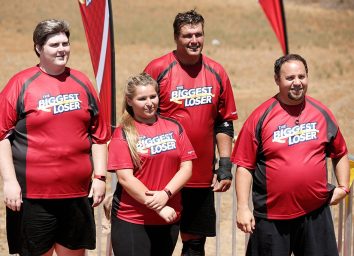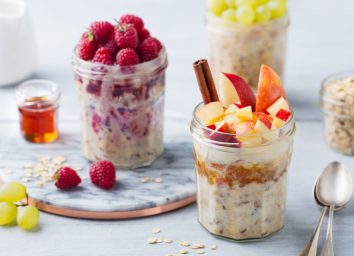Should You Eat Breakfast?
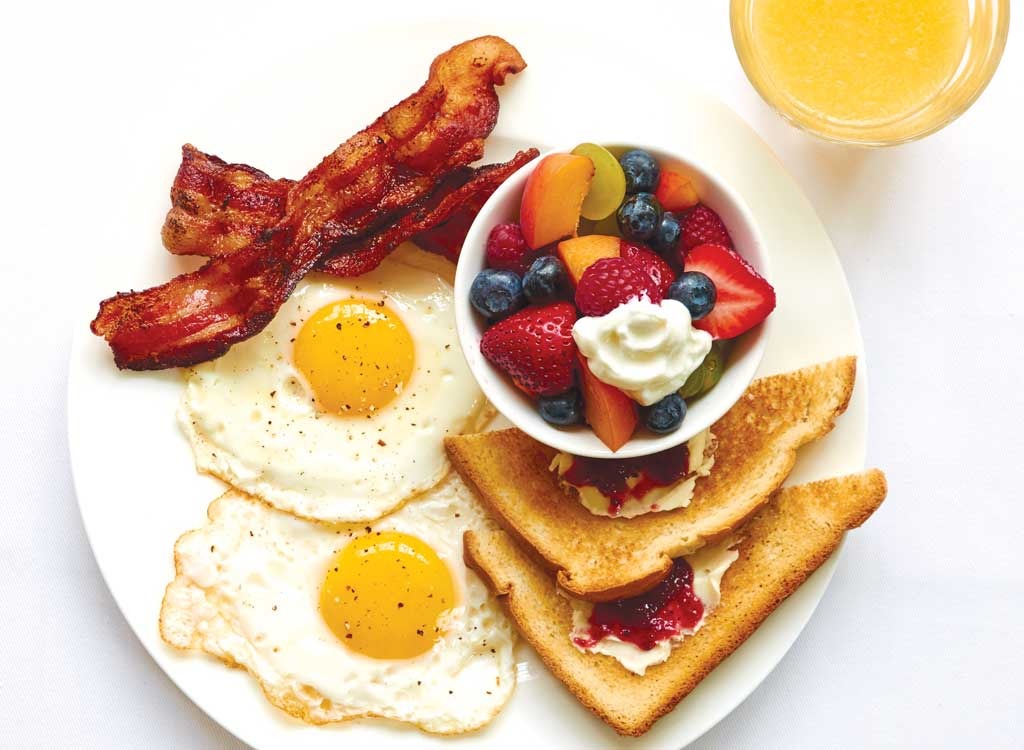
Remember when the only debate you had about breakfast was scrambled or over-easy? Alas, those days have gone the way of Quisp and Dino Pebbles. And although there's certainly been some drama around the breakfast table over the years—the '80s cholesterol freakout and '90s low-fat craze are, thankfully, history—today, the most important meal of the day is now the most controversial.
Conventional wisdom has held that eating breakfast is not only essential for fueling up for the day but crucial for maintaining a healthy weight. Consuming the majority of calories at the beginning of the day just makes sense, as it gives you more time to burn them off. Skipping breakfast will turn you into a zombie, or at least stall out your metabolism. Right?
A series of recent studies say: Not necessarily. Last summer, The New York Times summarized scientific support for the value of breakfast as "surprisingly meager." An entire issue of the American Journal of Nutrition was devoted to the topic, and they didn't disagree. In a study conducted at the University of Alabama at Birmingham, researchers followed 300 volunteers who were trying to lose weight. They assigned them into three groups: Always eat breakfast, don't eat breakfast, and proceed with your usual routine. After 16 weeks, none of the groups lost significant weight, and any weight loss that did occur was unaffected by eating breakfast or not.
In another study at the University of Bath, researchers found that eating breakfast didn't change the participants' metabolic rate or the number of calories they consumed later in the day. And another group of researchers reviewed a wide array of studies on the effect of eating breakfast on weight loss. They concluded that many of the studies were biased and unreliable because of the widespread feeling that breakfast must be good for us. "The belief of the proposed effect of breakfast on obesity exceeds the strength of clinical evidence," they harrumphed.
Some research goes a step further—it shows that skipping breakfast could actually be beneficial. Intermittent fasting is a hot trend in which dieters alternate between periods of eating and calorie restriction. The idea is that when you're fasting, the body burns fat instead of spending time processing food. In the most popular version of the practice, participants fast between 8pm and noon the next day. The idea is that extending the nighttime fast keeps the fat-burning going.
In a 2015 issue of The FASEB Journal, scientists reviewed six studies on obese participants who practiced intermittent fasting at least one day a week. On average, they lost 2.6 percent of their body weight after one month, 6.4 percent after three months, and 8.4 percent after six months. All saw decreased levels of bad cholesterol and insulin.
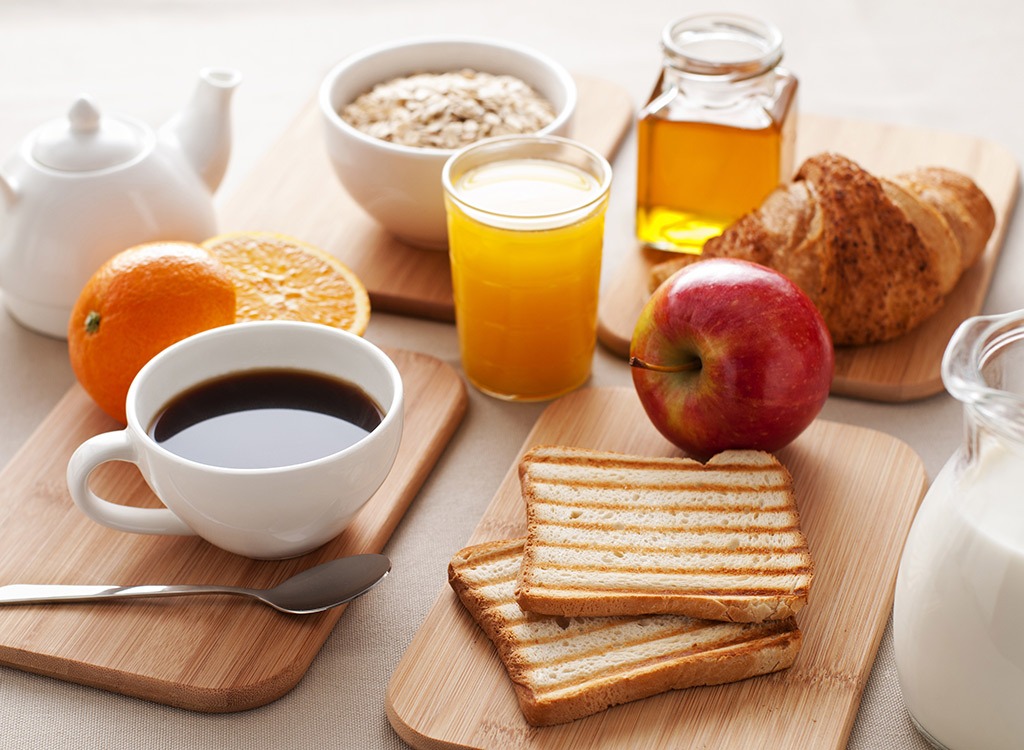
Yet the research is far from definitive. Valter D. Longo, PhD, a professor in biological science at USC and director of the USC Longevity Institute, believes that eating only two meals a day, plus a snack, is the best and safest strategy for weight management. "So skipping breakfast can work," he says. "However, since breakfast is usually the smallest meal, skipping lunch or dinner works much better."
"There are always going to be contradictory studies, but I am pro-breakfast," says Toby Amidor, a nutrition expert and author of The Greek Yogurt Cookbook. She notes that the size of the University of Alabama study was small, and that there's evidence that eating breakfast is crucial for weight loss. (We recommend starting with these 50 Best Overnight Oats Recipes for Weight Loss. Amidor cites statistics gathered by the National Weight Control Registry, which has collected 20 years of data on dieters who lost at least 30 pounds and kept it off for one year minimum. Seventy-eight percent of those dieters say they eat breakfast every day.
So what to do? We broke down the science and asked nutritionists for the ideal breakfast for each of us.
And after the pounds start flying off, help your chiseled body shine through with the help of these 44 Ways to Lose 4 Inches of Body Fat!
If You Exercise Before Lunch

The research: The science is split. If you don't like to eat breakfast, you aren't going to sink your weight-loss goals if you skip. If you're concerned about your weight and need to eat in the a.m., aim for 350 to 400 calories with an emphasis on protein. "There is new research emerging on protein at breakfast and its effect on weight," says Angela Lemond, a registered dietitian in Texas. "Getting adequate protein at breakfast can help with overall satiety throughout the day." However, if you exercise early in the day, many experts recommend going without any calories until after your workout. The reason: Working out in a fasted state means you're burning stored calories—i.e., fat—rather than calories you've eaten already. A study from Northumbria University found that people burn up to 20 percent more body fat by exercising in the morning on an empty stomach.
The verdict: Maybe Skip Breakfast
The ideal meal: "You want a calorie-controlled breakfast that will keep you satisfied," says Amidor. "I suggest something with whole grains, lean protein and/or healthy fat." Her favorite breakfast is eggs with shredded cheese and salsa, knocking out three food groups in one plate. Another good option is 1/2 cup of quick oats topped with a shot-glass-sized portion of almonds. (In a pinch, you can even grab something from this list of Every Menu Item at McDonald's—Ranked!.) Not okay: high-sugar cereals, doughnuts, bagels, and the like. Devoid of protein and fiber, foods like this set you up for a sugar crash, followed by more hunger and calories.
If You're a Teen or College Student

The research: The large-scale National Health and Nutrition Examination Survey found that teens who skip breakfast tend to have a higher body-mass index, bigger waists, and higher rates of obesity. A separate recent study examined the brain activity of 20 teens with an MRI machine while they performed tests. When the kids ate breakfast before the test, the machine showed higher activation in the frontal, premotor, and primary visual cortex areas compared with when they fasted.
The verdict: Eat breakfast
The ideal meal: Protein becomes more essential as kids get older; less protein means a slower metabolism and risk of weight gain. Amidor suggests nonfat plain Greek yogurt topped with fresh fruit. "The Greek yogurt would provide a boost of protein and calcium, which they need more of at this stage of life," she says. Girls hitting puberty need more iron, which can be found in fortified breakfast cereals, oatmeal, and eggs. No matter your age, don't miss these essential 29 Best-Ever Proteins for Weight Loss.
If You're Diabetic
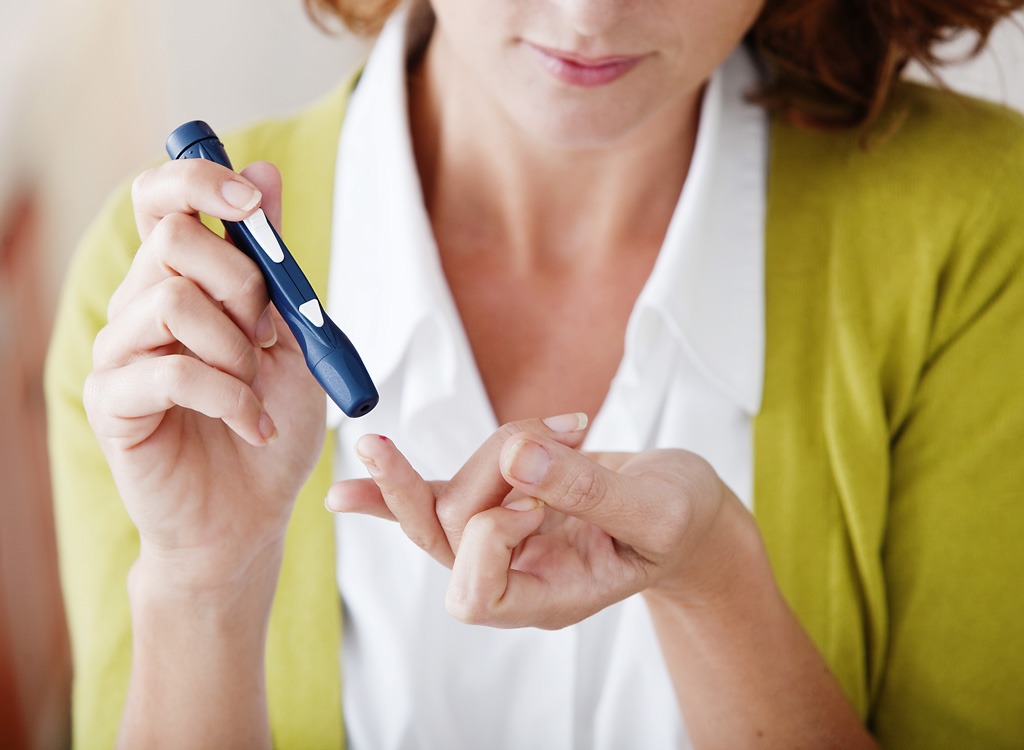
The research: The American Diabetes Association recommends that diabetics distribute their calories throughout the day in the form of four to five meals or snacks, including breakfast. The aim is to get most of your energy intake earlier in the day; therefore, the ADA recommends that "eating the largest meal of the day at breakfast and the smallest at dinner may help people with type 2 diabetes to better control their blood glucose."
The verdict: Eat breakfast
The ideal meal: Aim for 400- 500 calories with 7-10 grams of fiber. The ADA's suggestions include a slice of whole-wheat toast topped with mashed avocado and a hard-boiled egg, 1/4 cup of cottage cheese mixed with a 1/2 cup of canned peaches, or a banana or apple with two tablespoons of peanut butter. For the definitive list, click here for 50 Best Breakfast Foods for Weight Loss—Ranked.
If You're Happy with Your Weight

The research: If you're an active adult who has a good weight and BMI, no studies show that you're automatically going to balloon if you don't eat breakfast.
The verdict: Don't eat breakfast
The ideal meal: If you're going to eat up in the a.m, your morning meal should be around 350 to 400 calories, depending on your body composition. Satiety is the benchmark. Your goal is to prevent the 10:30 hangries from setting in, which often leave you grasping for whatever junk is at hand.
Lemond says the ideal breakfast should contain three components of the USDA's MyPlate: A good amount of protein (for adults, 20 to 30 grams), a quality carbohydrate, and a fruit or vegetable. She suggests a cup of low-fat cottage cheese mixed with . cup of wild blueberries on a whole-grain English muffin; or two eggs, an ounce of shredded cheese with sauteed spinach on a whole-wheat tortilla, and side of mango. Amy Shapiro, MS, RD, a licensed dietitian and nutritionist who practices in New York City, recommends that any carbs you eat for breakfast come from whole grains or vegetables and that protein always be part of the equation: A grab-and-go breakfast of oatmeal can be supplemented with nuts or two hardboiled eggs. For even more amazing tips and tricks, click here for 55 Best-Ever Ways to Boost Your Metabolism.
If You're a Child
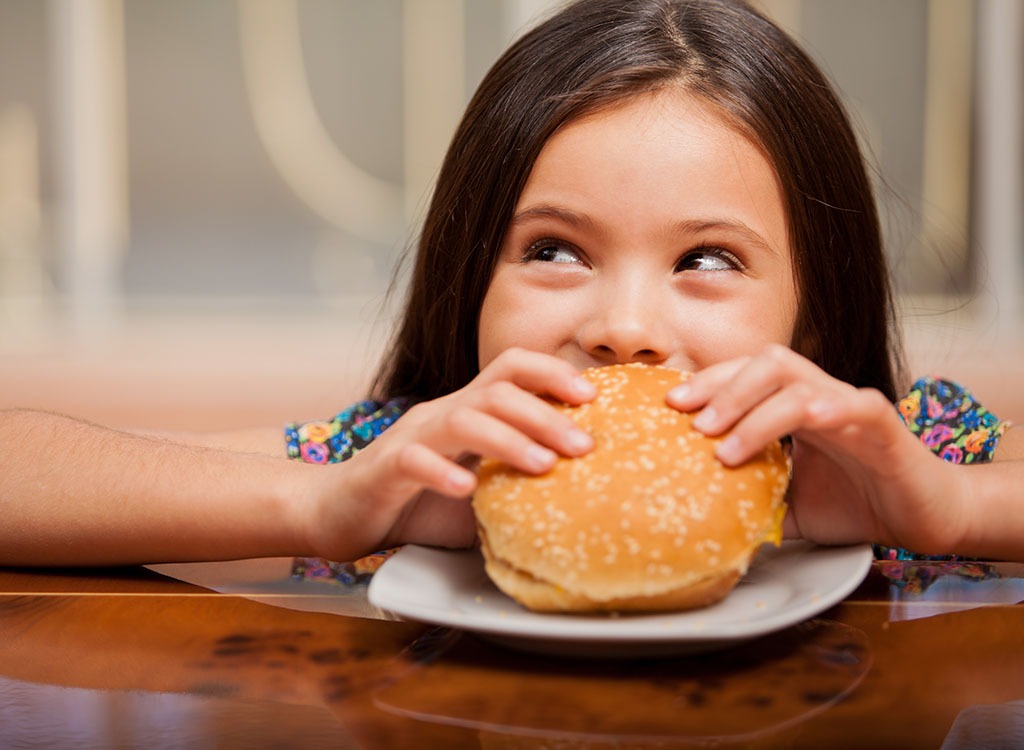
The research: Research shows that children's brains require more glucose to fuel growth at night compared with adults; as a result, they wake up in a more depleted state than grown-ups. A meal in the morning restores the essential energy-producing sugar, for optimal cognitive functioning at school. A separate review of 45 studies found that kids who eat breakfast fare better when it comes to memory and attention span, especially in the second half of the morning when these skills tend to dip. And nutritionists are universally in favor of an a.m. meal for children: "Anecdotally speaking, the students I work with tend to perform better with breakfast," says Marisa Moore, MBA RDN LD, a registered dietitian nutritionist who practices in Atlanta.
The verdict: Eat breakfast!
The ideal meal: Compared with adults, kids need more protein, fiber, and calcium per pound of body weight. Amidor suggests two, 6-inch whole-grain banana pancakes topped with 2 teaspoons of 100 percent maple syrup, with a glass of low-fat or fat-free milk. "There you have whole grains, fruit in the pancake, and dairy with calcium and protein. Plus, it's a kid-friendly meal!" she says. If you're a parent, chances are your kid also wants a Coke; don't miss this essential report: The 36 Top Sodas—Ranked!
AND FOR THE REST OF US
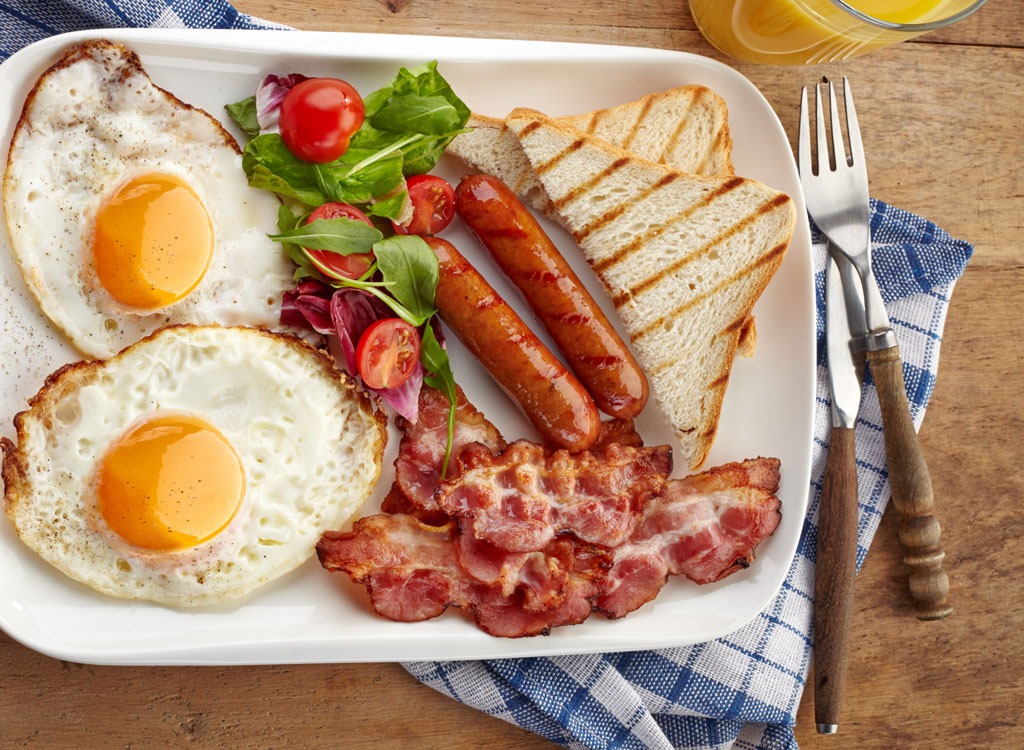
If you have trouble choking down anything but coffee in the a.m., stop feeling guilty: You aren't going to kill your metabolism if you skip. If intermittent fasting is the diet plan for you, go for it.
Conversely, if the idea of skipping breakfast makes you woozy, don't starve yourself under the guise of improving your health—you won't be.
Know that breakfast doesn't have to be a big deal. "You don't have to sit down and have a fully loaded breakfast every morning," says Amidor. "Even having whole-grain cereal and milk is great, because most people don't get enough whole grains, and the milk has nine essential vitamins and minerals and some protein." Shapiro always advises her clients to eat breakfast, telling them that it can be a piece of fruit, or even their morning latte, which is about a cup and a half of milk.
Despite all the contradictory science, the decision whether to eat breakfast boils down to how you feel before noon. "Though I'm keen on providing advice based on the science, there's very little that can convince me (personally) not to eat breakfast," says Marisa Moore, the Atlanta nutritionist. "It gives me the energy I need to start the day."
Eat This, Not That! for Breakfast
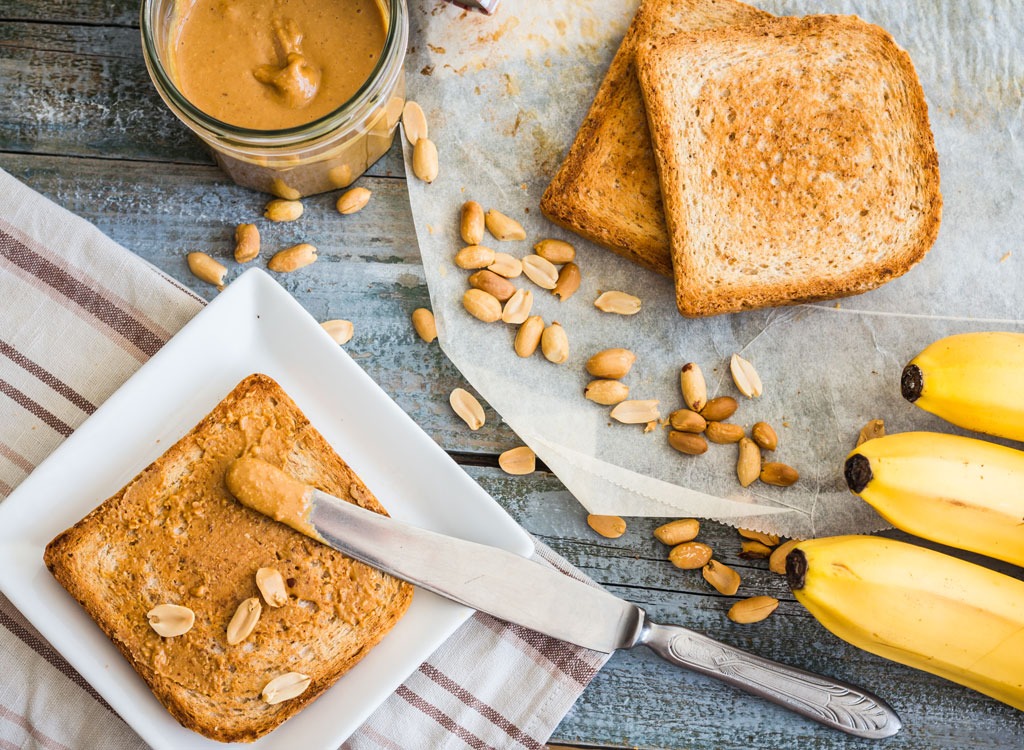
While some breakfast foods are obvious indulgences (hello, cinnamon buns), other, seemingly healthy choices can also sabotage your success. Swap your a.m go-tos for our delicious slimming picks below to jump-start your progress while you're still in your PJs—now that's what we call a productive morning!
WHEN YOU'RE CRAVING TOASTY CARBS

Eat This!
Sprouted Grain Toast with Peanut Butter
Not That!
Whole Grain Bagel with Butter
Even if they're whole-wheat, bagels can pack as many calories as three or four slices of bread. Scary, right? Skip the buttered bagel—a combination that will cost you about 340 calories and 50 grams of carbs—and spread a tablespoon of natural peanut butter on two slices of sprouted grain bread instead. (We like Food For Life's Ezekiel 4:9 varieties, which are found in the freezer section and made with sprouted wheat, barley, rye, oats, millet and brown rice). The savory swap provides eight grams of flab-fighting protein, four grams of satiating fat and will save you nearly 80 calories a day. If you stick with the nut butter and bread for a mere month and a half, you'll drop a pound of fat from your frame.
If nuts aren't your thing, mashed avocado also makes a filling toast topper that fights fat.
WHEN YOU NEED SOMETHING FRUITY

Eat This!
Orange
Not That!
8-Ounce Glass of Orange Juice
Swap your daily cup of orange juice for an actual orange. A piece of fruit not only costs a lot less than a carton of juice but also provides more belly-filling, health-promoting fiber for a fraction of the calories and sugar. In fact, making this swap every day for a month will save you 1,260 calories and 257 grams of the waist-widening sweet stuff—that's what you'd find in 78 Oreo cookies!
WHEN ONLY CEREAL WILL DO
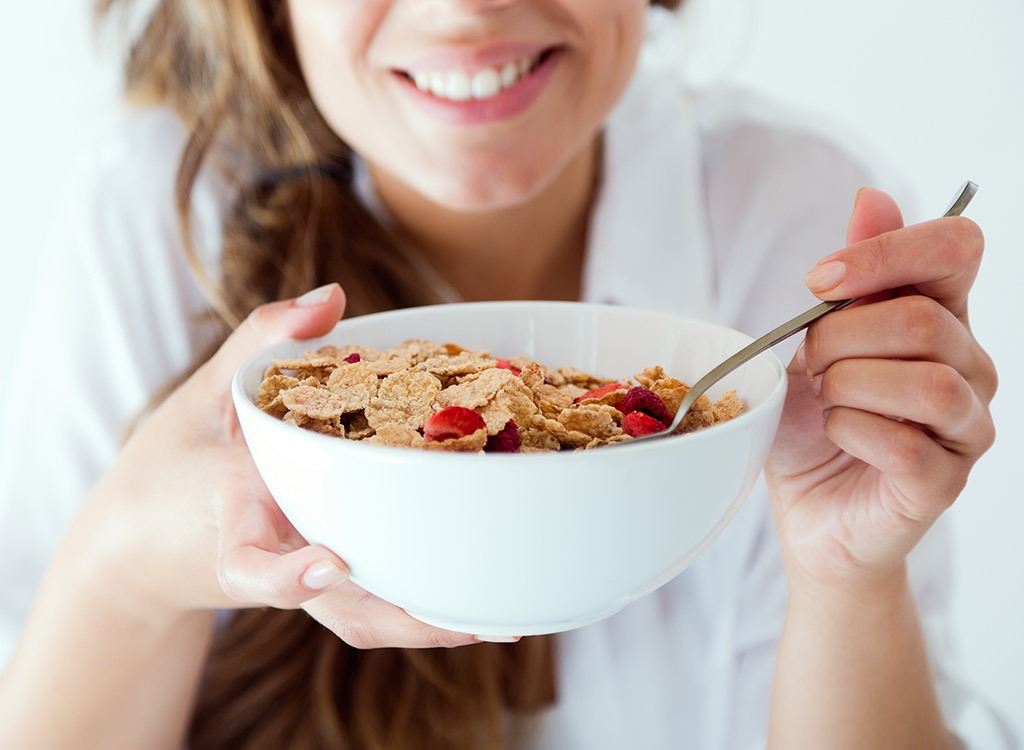
Eat This!
High-Fiber, Low-Sugar Cereal
Not That!
Low-Fiber, High-Sugar Cereal
Honey Smacks and Cocoa Pebbles are better left in your childhood memories than your cereal bowl. Morning classics such as these tend to be high in sugar, which can mess with your blood sugar and leave your stomach growling soon after you've finished eaten. They're also lower in vitamins, minerals, fiber and muscle-building protein than their grown-up counterparts. We're fans of high-fiber and protein-rich options like General Mills Wheaties and Erewhon Raisin Bran—and don't miss our list of The 28 Worst Breakfast Cereals—Ranked!
WHEN YOU'RE IN THE MOOD FOR SOMETHING CREAMY
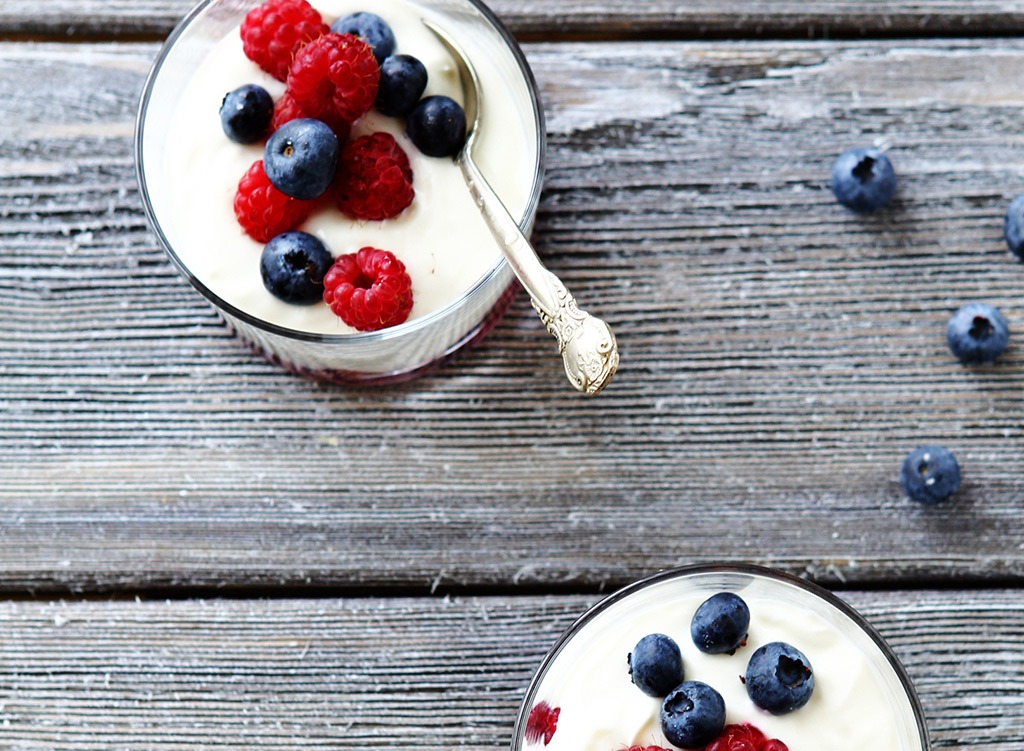
Eat This!
Greek Yogurt with Fresh Fruit
Not That!
Fruit-Flavored Greek Yogurt
Though all Greek yogurts pack more protein than traditional varieties, not all containers are created equal—especially when it comes to sugar counts. Swap your fruit-flavored yogurt (which could easily be filled with 30 grams of the sweet stuff) for a plain, low-sugar variety like Fage 2%. To add a hint of flavor, top it off with your favorite berries. Strawberries, blueberries, raspberries and blackberries are all packed with polyphenols, naturally occurring chemicals that aid weight loss and stop fat cells from forming. No strawberry-flavored yogurt can claim that!
WHEN BREAKFAST IS A MUST
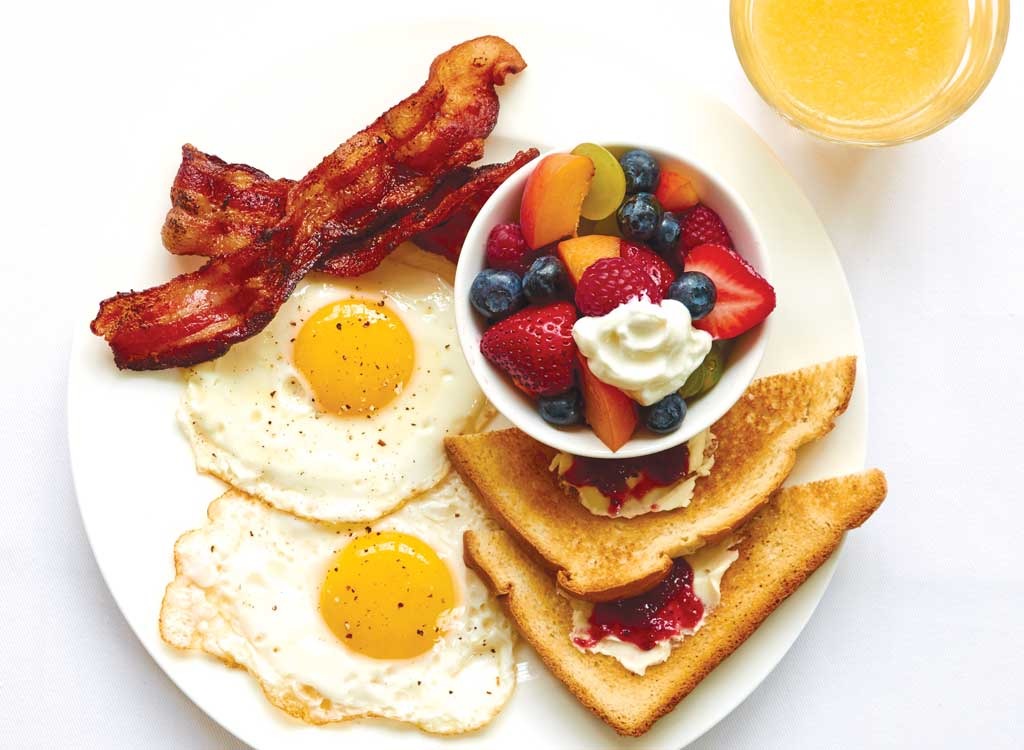
Eat This!
Traditional Pork Bacon
Not That!
Turkey Bacon
Everything tastes better with bacon—literally, everything (like these amazing breakfast tacos). But if you make a switch to the turkey variety in the name of weight loss, you'll be doing your body—and your taste buds—a disservice. Sure, ditching the pork saves you 13 calories and a gram of fat per slice, but its poultry replacement is packed with excess sodium. Starting your day with all this salt will cause your body to retain water, giving your stomach a paunchy, bloated look — even if you've lost belly fat. Plus, pork offers more satiating protein and heart-healthy monounsaturated fats than turkey versions. Bear in mind that no matter which option you add to your breakfast plate, serving size matters. Stick to two or three slices per morning. Read on for these amazing 30 Foods That Melt Love Handles!
WHEN YOU WANT TO GET CRACKIN'
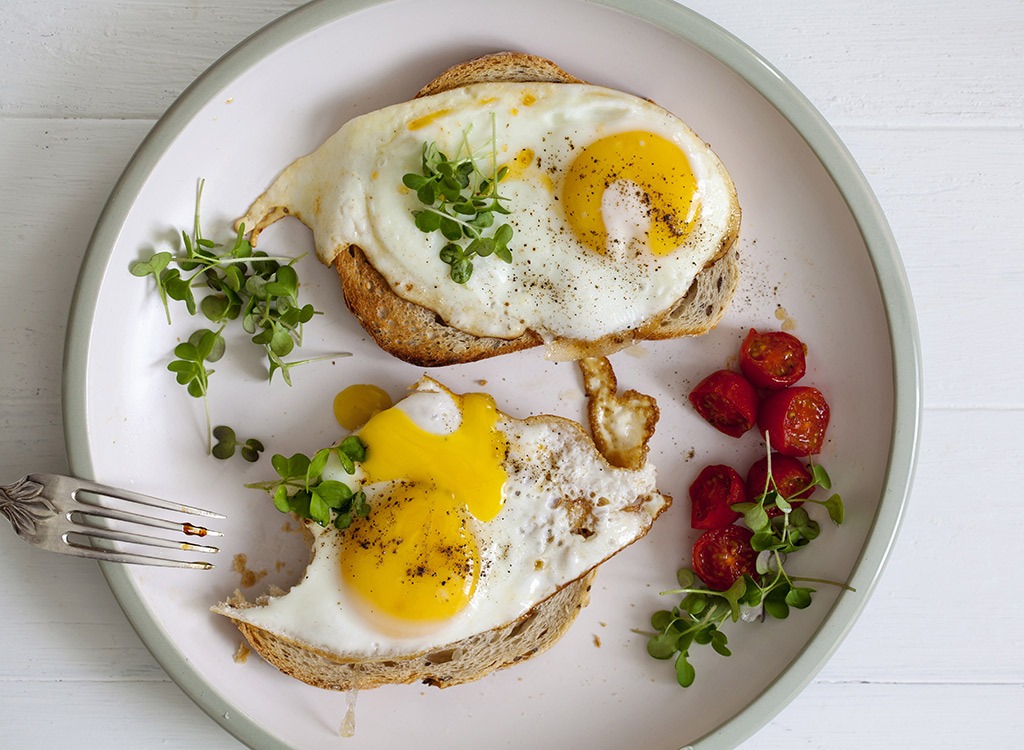
Eat This!
Whole Eggs
Not That!
Egg Whites
Hard-boiled, fried, poached, scrambled or folded into an omelet: there's no wrong way to eat an egg—unless you remove the yolk. Earlier this year, the 2015 Dietary Guidelines Advisory Committee dropped their longstanding recommendation to limit dietary cholesterol—a nutrient that's abundant in the yellow center of eggs—due to countless studies confirming that this nutrient has little effect on blood cholesterol levels. In fact, the yolk contains choline, a fat-fighting nutrient that can whittle your waistline, making whole egg dishes a definite Eat This!
